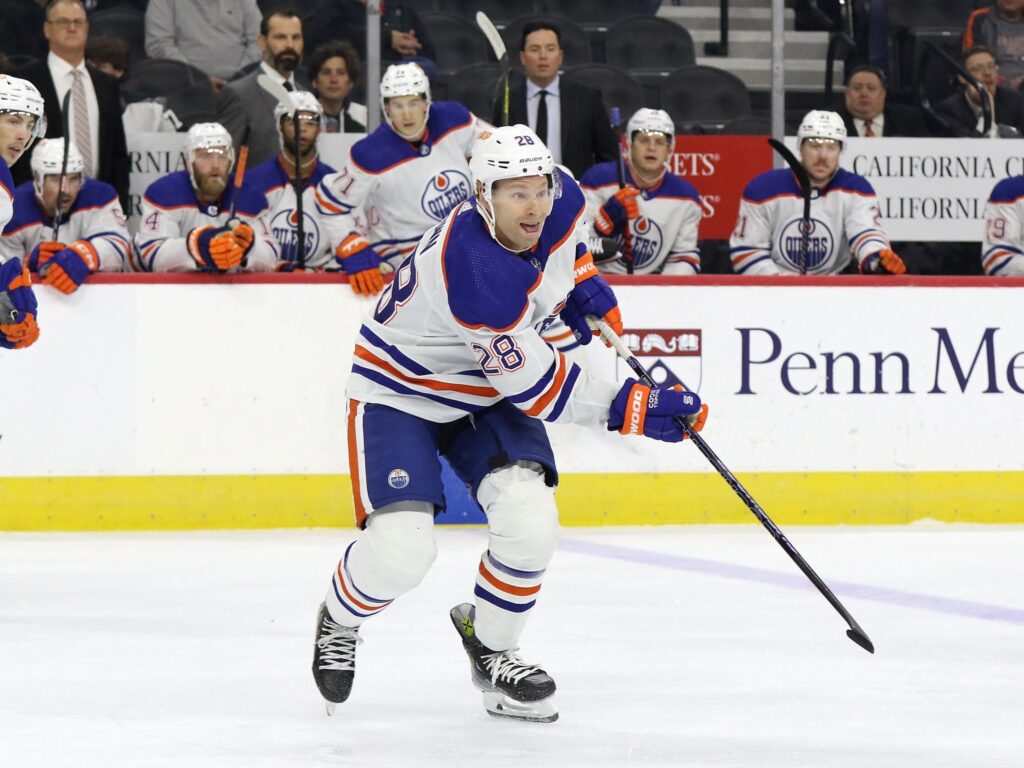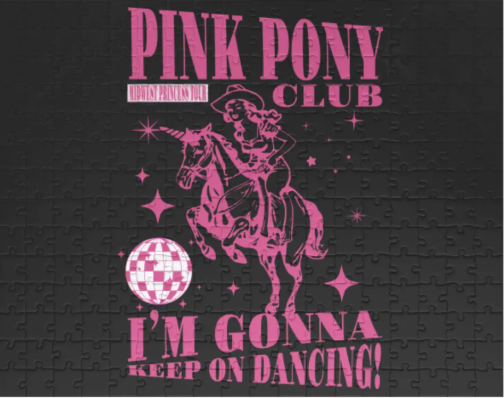Every Stanley Cup run has a soundtrack. It’s usually born from the thunder of a post-whistle scrum, the roar of the home crowd, or the high-octane crunch of a heavy metal riff. For the 2025 Edmonton Oilers, it was something else entirely. It was the synth-pop shimmer of Chappell Roan’s “Pink Pony Club,” a song that became the city’s unifying anthem before souring into a painful reminder of what might have been. Now, thanks to former Oiler Connor Brown, the full story of the song’s rise and fall is finally out, and it’s a lesson in chemistry, superstition, and the cruel nature of the hockey gods.
Also on the EDGE – The Battles That Will Define the Edmonton Oilers’ 2025-26 Training Camp
From a San Jose Piano Bar to the Oilers’ Inner Sanctum
For weeks during the Oilers’ dominant push to the Final, the question lingered: Why “Pink Pony Club”? The Grammy-winner’s ode to leaving a small town to pursue a dream in West Hollywood doesn’t exactly scream “playoff hockey.” The origin was a closely guarded secret within the dressing room, a mystery that only fueled the song’s legend. Players like Evan Bouchard and Calvin Pickard were tight-lipped, enjoying the public speculation.
Speaking on the 100% Hockey podcast, Connor Brown, now with the New Jersey Devils, finally pulled back the curtain. The anthem wasn’t the product of a marketing meeting or a player’s personal playlist. It was born from a moment of pure serendipity.

“We were out for dinner in San Jose,” Brown explained, “and there was a girl playing the piano, and she started singing ‘Pink Pony Club’.” The track, with its infectious hook and pop sheen, struck a chord with the players. As they bobbed their heads, a collective decision was made: they needed a new “win” song. After their next victory, the speakers in the Oilers’ locker room, typically reserved for rock or high-energy EDM, blasted Roan’s anthem. The tradition had begun. They kept the story “hush hush,” letting the mystique build as they steamrolled through the Western Conference.
An 18,000-Voice Chorus
What started as an inside joke quickly became a cultural phenomenon in Edmonton. The song escaped the confines of the locker room and took over the city. The anthem wasn’t just for the players anymore—it belonged to everyone. Radio stations put it in heavy rotation. Fans hummed it on the LRT.
Most powerfully, it became a fixture at Rogers Place. In the tense final minutes of a home game, as the Oilers protected a lead, the opening notes of “Pink Pony Club” would hit the PA system. Suddenly, 18,000 fans were on their feet, singing along, providing the soundtrack to Edmonton’s inevitable victory. The song’s status as a celebrated “Gay Anthem” also resonated deeply with a progressive segment of the fanbase, adding a layer of acceptance and inclusivity to the team’s identity. It was more than a song; it was a statement. Chappell Roan was unwittingly serving up the score for a championship run.
Also on the EDGE – The Razor’s Edge: Inside Connor McDavid’s Calculated Contract Standoff
An Affront to the Hockey Gords
This is where the story turns. In hockey, ritual is everything. You don’t touch the conference trophy. You grow a beard. And you absolutely do not tempt fate. A victory song is just that—a song played after a victory is secured. It’s the reward, the exhale, the celebration. It is not a hype track.
Before Game 2 of the Stanley Cup Final, someone made a fatal error. As the pre-game hype video played on the jumbotron, the familiar notes of “Pink Pony Club” rang through the arena. For many, it was a moment of celebration, a declaration of confidence. For others, it was an “overwhelming sinking feeling.” Playing the victory song before the game was an act of supreme hubris. It was, as one observer noted, “an affront to the Hockey Gords” and “the jinx of all jinxes.”

The Oilers went on to lose that critical Game 2. And eventually, they lost the series. The magic was gone, the ritual broken. What had been a symbol of their unstoppable momentum suddenly felt like a harbinger of their downfall.
A Song that Stings
The final, bitter irony came after the Florida Panthers hoisted the Stanley Cup. As the Panthers celebrated their victory, they were heard singing “Pink Pony Club,” gleefully rubbing salt in the Oilers’ fresh wound. They had not only taken the Cup; they had stolen Edmonton’s song.
For the man who was there at its inception, the song is now unlistenable. “After we lost, I can’t listen to it anymore,” Brown confessed on his podcast. “It’s wiped off every time, it just reminds me. Now it just stings.”
The story of the Oilers and “Pink Pony Club” will go down in hockey lore as a cautionary tale. It’s a story of how a team’s unique identity, forged in a random moment of joy, can galvanize a city. But it’s also a stark reminder that in the high-stakes world of playoff hockey, the line between a beloved tradition and a fatal jinx is dangerously thin. The Pink Pony Club was the best party in town, right up until the music stopped.
Created with the aid of Gemini AI
